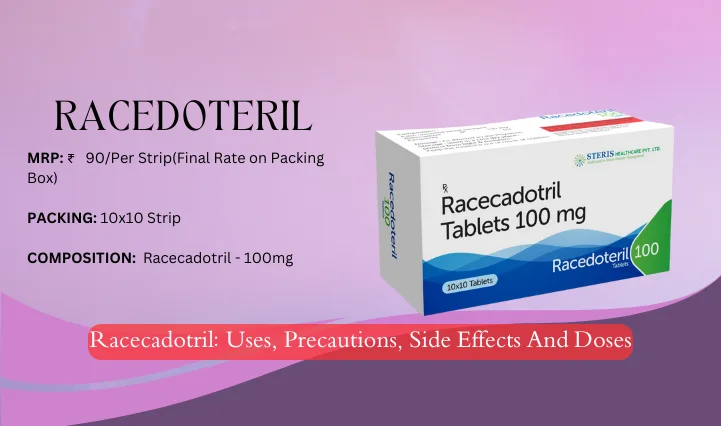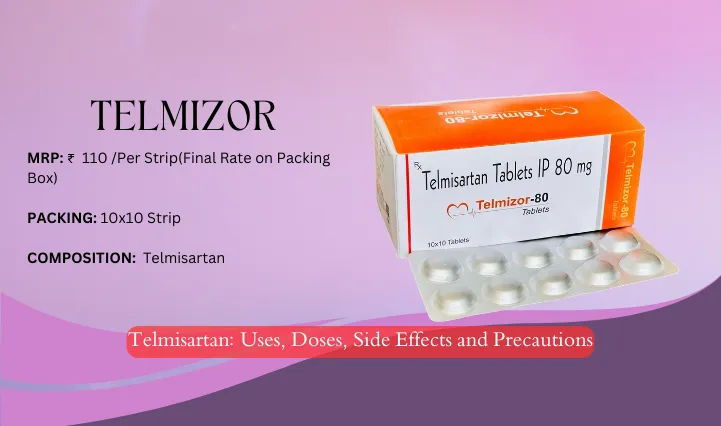Racecadotril is used for the treatment of acute diarrhea and is often preferred over other types of medications as it is better tolerated by patients and causes less constipation and gas. This blog discusses the Racecadotril uses, precautions, side effects, and doses.
How Does Racecadotril Work?
Racecadotril is a medication that works by acting on the peripheral lining of the stomach and intestine. This medication is an enkephalinase inhibitor. It works by inhibiting the endopeptidase compound also known as enkephalinase. This reduces the amount of water and electrolytes. Along with treating acute diarrhea, it also reduces pain and abdominal distention or bloating.
Racecadotril Uses
This medication is often used for acute diarrhea in adults and children in combination with oral rehydration therapy. Along with this, it is also used to treat –
- Traveler’s diarrhea as an off-label medication.
- Diarrhea in patients with irritable bowel syndrome (IBS-D) for investigational purposes.
It is not recommended for use in some cases such as
- Chronic diarrhea.
- Infectious diarrhea with fever or bloody stools.
- Diarrhea caused by antibiotics (C. difficile infection).
Racecadotril Dosage
In the case of Adults, a patient can take a 100 mg capsule three times daily, taken before meals. This is usually for three to seven days. In the case of children, it depends upon their weight. Children under 9kg are recommended 10 mg three times a day. Children who weigh between 9 and 30 kg are recommended a 30 mg dosage three times a day and children whose weight is more than 30 kg are recommended 60 mg three times a day. The medication should not be taken for more than 7 days.
Racecadotril Precautions
This medication should be avoided in the following cases –
- Patients with severe renal or hepatic impairment.
- Chronic diarrhea conditions (e.g., Crohn’s disease, ulcerative colitis).
- Diarrhea with bloody stools or high fever could be possible due to bacterial infections.
- If the patient is allergic to the medication or any of its components.
Some precautions that would apply to the patients taking this medication are –
- Dehydration risk: This risk is higher in children and elderly patients. It needs to be coupled with oral rehydration therapy to minimize this risk.
- Pregnancy & Lactation: There isn’t enough data with regard to this. It is best to follow doctors advice about this.
Racecadotril Drug Interactions
Racecadotril is one medication with the least amount of drug interactions. However, it can interact with the following types of medication. Some of the medications with which it interacts are –
- ACE inhibitors or blood pressure and heart-related medications.
- Diuretics – A patient may take this medication to increase urine production.
Racecadotril Storage Guidelines
Store this medication in the following manner.
- They should be stored at a temperature of 20-25 degrees Celsius. Avoid storing them in the freezer or very hot places.
- Store it in a dry place away from humidity.
- Store this medication away from direct sunlight as it can degrade due to UV light.
- It is best to store the medication in its original packaging.
- It should be kept away from children and pets.
Frequently Asked Questions
Ans. A doctor may give this medication for the treatment of acute diarrhea.
Ans. Racecadotril is a better medication as it is a more effective and efficient medication with fewer side effects in comparison to Loperamide.
Ans. Yes, children can take it, however, the dosage depends upon the weight of the child. The patient should take it with an oral rehydration solution to minimize the risk of dehydration.
Ans. Take this medication before a meal.
Disclaimer: The information on this blog is strictly for informational purposes. It is not a substitute for professional medical advice. Please consult your doctor before taking any medication.










